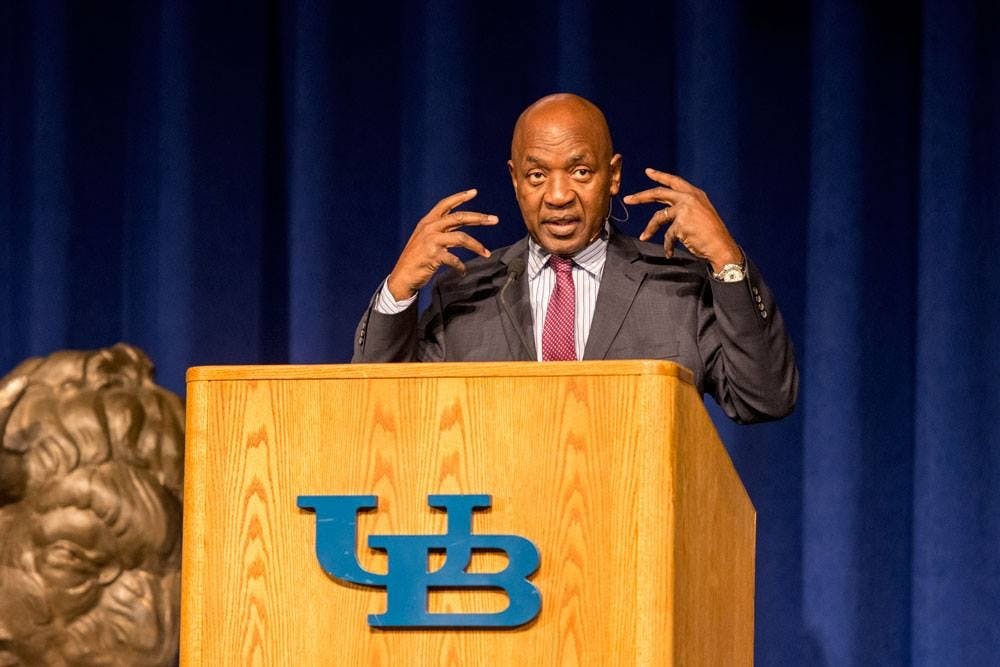When Charles Ogletree returned home from college, he discovered his bed was no longer in his old bedroom.
As the first in his family to graduate high school and attend college, Ogletree’s parents had gotten rid of his bed in order to give him no choice but to succeed.
Ogletree spoke as part of UB’s 29th annual Distinguished Speakers Series and as the 40th annual Martin Luther King Jr. Commemoration Keynote Speaker Thursday night in Alumni Arena. Ogletree, a Harvard law professor, discussed growing up during the civil rights movement, the current race relations in the United Stated today as well as the importance of faith and education in his life.
His mother grew up in Arkansas and his father grew up in Alabama, but eventually moved to the west coast for better opportunity. Ogletree was the eldest of three siblings and he and his family grew up in California.
In 1974, he graduated with a bachelor of arts from Stanford in political science. Ogletree said he went into his undergraduate career with the goal of graduating in three years so he would be able to continue to higher education quicker. He said he borrowed $5,000 in order to attend graduate school at Stanford, which he said was “a lot of money back then.”
He said leaders such as Martin Luther King Jr. and Thurgood Marshall were figures he looked up to as a student.
“I never had the pleasure of meeting him,” Ogletree said about King. “I wish I had.”
Ogletree said as a child, he loved reading about the world and would often stay up even after his parents sent him to bed so he could read with his flashlight on. He said at a young age he had an appreciation for education.
“To me [education] is the key that turns things in the right direction,” he said. “It’s better to get a step up than just a step out.”
After graduating from Harvard Law School with his Juris Doctor, Ogletree began teaching as a professor of law at the university. Ogletree taught notable figures during his time as a law professor, including President Barack Obama and First Lady Michelle Obama.
As a student who came from a family who wasn’t well-off, Ogletree began a scholarship for students like him who were struggling to get by but “[planned] to stay in school.”
He said one moment that particularly moved him was when a student who was able to attend Harvard Law School as a result of the scholarship approached him to introduce himself. Although Ogletree said the United States has made progress in terms of race relations, he said there is still progress to be made.
Teresa Miller, vice provost for equity and inclusion, asked Ogletree his thoughts on the line between freedom of speech and being respectful of all. She said this has been “quite a year of unrest” and although free speech is something that is valued on college campuses, it is necessary to be inclusive of all.
In September, the question of freedom of speech on UB’s campus was raised after graduate fine arts student Ashley Powell hung signs around campus reading “White Only” and “Black Only.”
In December, UB created an interim art policy that requires art outside the Center of the Arts to have a note or explanation next to the display. It was already required that art projects in common areas on campus be reviewed by the Environment, Health and Safety Department prior to being displayed.
Although many were upset by the art, Ogletree said he was in the minority that felt as though it was Powell’s first amendment right to hang the art despite students who may have been offended by it.
Ogletree said everyone has the right to free speech, even if it means making some uncomfortable.
“It creates more dialogue, not less dialogue,” he said.
Ogletree ultimately said family and faith are the main focuses in his life and are what drove him to the success he has today. When Ogletree’s sister was 36 years old, she was shot and killed. His sister, who was a sheriff in the family’s California hometown, was killed by a fellow police officer, something the family only found out last year.
He said although this happened years ago, he fought for justice to find out what happened to his sister and even paid money for investigative purposes.
Even with the struggles he has faced in his life, Ogletree said that his faith is the one thing that has been positive. Growing up, his family had a calendar with Martin Luther King Jr. on it as well as a calendar with Jesus on it. He said he makes a point of attending mass each week and will always make room for his faith in his life.
“Faith makes all the difference in the world,” he said.
The next Distinguished Speaker will be Siddhartha Mukherjee, a cancer physician, researcher and Pulitzer Prize-winning author. Mukherjee will speak in Alumni Arena on April 16.
Marlee Tuskes is the senior news editor and can be reached at marlee.tuskes@ubspectrum.com. Follow her on Twitter at @marleetuskes5.





